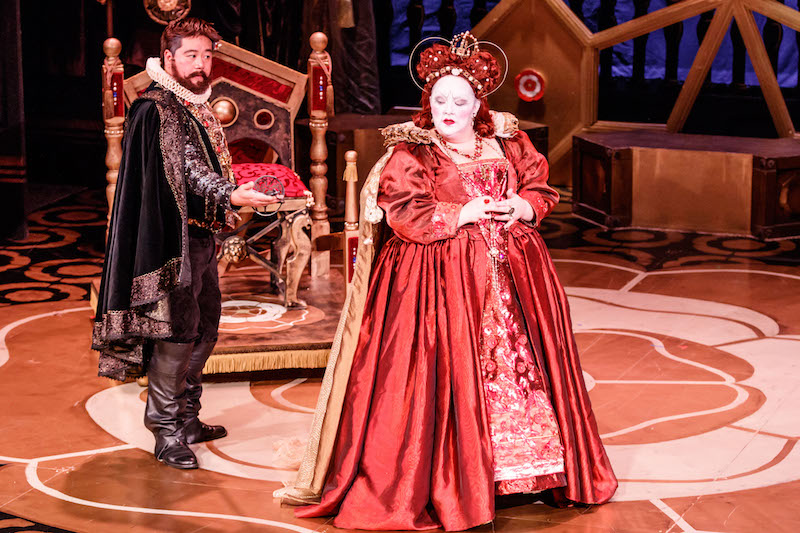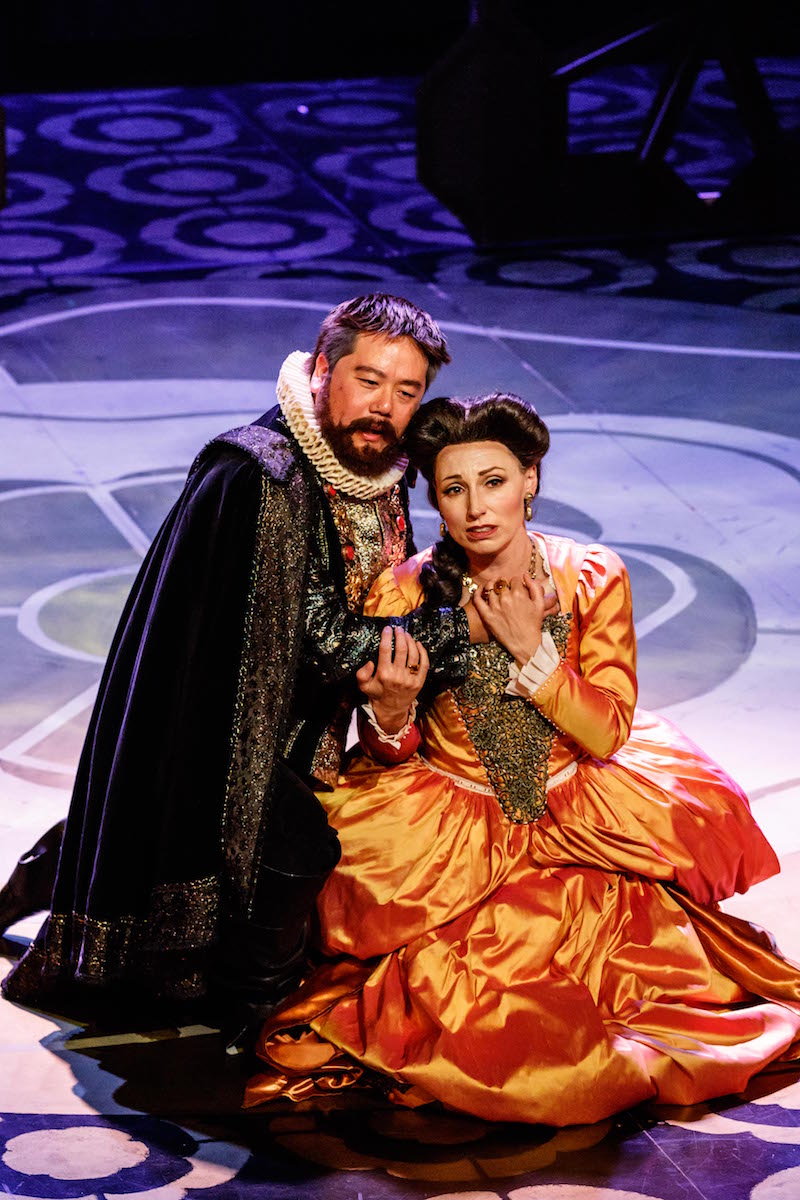With Roberto Devereux, Melbourne Opera completes the Donizetti Tudor trilogy including Anna Bolena (2015) and Maria Stuarda (2016); the first time this achievement has been accomplished in the country. Roberto Devereux is a mature work, written just after Lucia di Lammermoor though not Donizetti’s most accomplished opera. The libretto by Cammarano is thin in both substance and subtlety and the music is not the composer’s finest, yet we were all grateful to hear this rarely performed work for its opening run by Melbourne Opera.
 Henry Choo and Helena Dix. Photograph © Robin Halls
Henry Choo and Helena Dix. Photograph © Robin Halls
The old Athenaeum Theatre on Collins Street (completed in 1842) that hosts pop productions alongside opera is a grand old lady, though now tatty at the edges. The acoustics of the theatre are as dry as a biscuit with no bloom on the sound whatsoever; when the music stops, it stops into utter silence.
The story over three acts (set in 1599-1601 when the Virgin Queen would have been in her late 60s) tells of Sara, Duchess of Nottingham and the Monarch, both in love with the same man (Robert Devereaux, Earl of Essex) about to be unjustly executed for treason. Various misunderstandings prevail and in the end he is needlessly executed at the Tower with both women left distraught.
Suzanne Chaundy directs this Melbourne Opera production on sets designed by Christina Logan-Bell (subtly lit by Lucy Birkinshaw) which are pleasingly minimal, adaptable and effective, featuring the Tudor rose in red and white, Elizabeth I being the last Tudor Monarch and a manifestation of the new unity of England.
On opening night the Melbourne Opera Orchestra, conducted by Greg Hocking, occasionally sounded rough and scratchy with less than satisfactory rapport, especially in ensemble entries and ritardandos. There were missed and early entries as well as regular intonation problems. The chorus was often uneven, ragged and lacking in a choral body of sound. All of these deficits will no doubt benefit from repeated performances. Hocking’s direction was ebullient, effusive and energetic though sometimes unclear. One might hope that the freneticism could be calmed to afford greater clarity and expressive subtlety.
 Henry Choo and Danielle Calder. Photograph © Robin Halls
Henry Choo and Danielle Calder. Photograph © Robin Halls
The major problem of the production, however, was the English translation (Geoffrey Harris) that was literal and quite unmusical. It sat at odds with the bel canto style and especially in this dry acoustic at times sounded prosaic and even comical. There were titters throughout the audience as Robert Devereaux, realising his dark predicament, sang: “Oh God!”
It could have been opening night jitters but there was a lot of overly loud singing throughout, not helped by this unforgiving acoustic. Lyric coloratura tenor Henry Choo was an engaged and affecting Robert Devereux, notably in his Tower cell in Act III. Danielle Calder’s Sara, Duchess of Nottingham was also moving, with a clear and musical sound across her impressive range. Phillip Calcagno‘s Duke of Nottingham, Jason Wasley’s Lord Cecil and Eddie Muliaumaseali’i’s Sir Walter Raleigh were all solid performances both in terms of vocal quality and theatre.
But the night belonged to Australian soprano Helena Dix, now an associate of the Metropolitan Opera of New York, singing the role of Elizabeth I, Queen of England. Dix’s soprano is an impressive instrument that still has a way to mature into full and extraordinary bloom. She is also a fine actor, managing the challenges through the opera from regal petulance to jealousy, despair, monstrous anger and ultimately, de-wigged derangement.
An imposing figure, Dix provided a formidable presence on a somewhat petite stage, dressed superbly (Jennie Tate’s costumes, courtesy of Opera Australia) in elaborately embroidered Pompeii red and finally ivory silk as a further symbol of the Tudor rose. She managed the daunting challenges of the work without issue; her technique sure and her vocal capacity outstanding. The sound quality is still light though it will darken with time. It was good to read in her biography that Isolde is planned for 2020.











Comments
Log in to join the conversation.